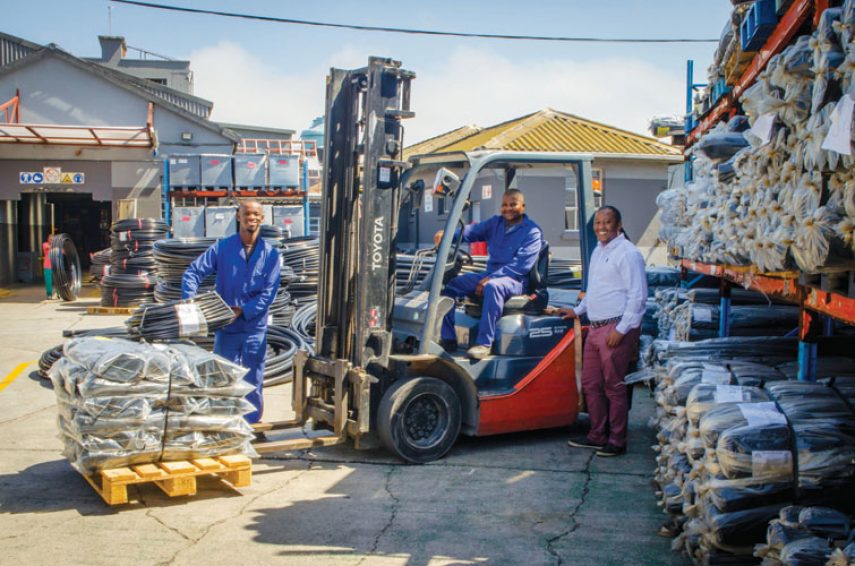ONE of the Eastern Cape’s longest-standing companies has finalised an empowerment deal with the Industrial Development Corporation (IDC) – to the benefit of its 80-strong labour force which now ranks as a shareholder.
Thanks to the restructuring deal, Rhino Manufacturing – formerly known as Rhino Plastics which was launched 50 years ago – is now a B-BBEE Level 2 company. Since the new deal was signed late last year, business has taken off, making strides in the plastics recycling and manufacturing sector while strengthening its lead in the supply of plastic products to the construction, agricultural and the packaging sector nationally and into Africa.
Under the new business structure, the 80 employees at the North End plant – who each support, on average, five dependants – now own a collective 10% stake in Rhino Manufacturing, with local entrepreneur Siyabulela Mandla coming on board with a 41% shareholding, and the remainder held by Rhino Plastics, headed by businessman Brian van Niekerk.
Mandla, a strong advocate for the upliftment of previously disadvantaged communities, said of the deal: “We have a responsibility to shape and improve the living conditions of our communities, where unemployment and inequality are our biggest challenges. It always inspires me to see business used as a catalyst for change in this regard.”
Mandla, 37, is a former regional SAB Kickstart, Seda Stars Business Competition and National Gazelles SME programme winner. His successful ventures include 469 Carwash & Café, 469 Bar Lounge & Butchery, Patapata Lifestyle, and Kasi Craft Beverages in Motherwell and New Brighton.
“Thanks to the new deal, we are now geared to expand the company’s footprint and look into new opportunities in the public sector and into Africa,” he said.
“We are also looking at diversifying our product range to include products such as plastic droppers and poles, plastic garden furniture and fibre optic sleeves, as well as recycling plastic for manufacturing purposes.” The company’s recycling of plastic waste sees it converted into pellets, which in turn are melted down and used to manufacture new plastic products. Rhino Manufacturing also makes and distributes high-quality film for the construction and agricultural sector, irrigation piping for the farming sector, high-density polymer pressure pipes, as well as industrial packaging.
“We are already working closely with businesses like Ford and Volkswagen to buy their recyclable plastics and repurpose them into durable products.”
Mzwamadoda Doyi, 34, a Rhino Manufacturing truck driver and has been with the company for 15 years said, “This deal means a lot to us as employees, and to me. The company’s prospects are looking much better thanks to the deal with the IDC. There are also better opportunities for the business, which in turn will lead to better profits for the company which we as employees now get to share in.”
Chrisman Rono, a forklift driver who has been with the company for 13 years, said, “Having a stake in the employees’ trust is a new experience for me. It makes me feel empowered, but it is also motivating, as I know that I now hold a stake in the company’s profits.”
Kingsley Dell-Robertson, IDC regional manager for the Eastern Cape western region, said the parastatal stepped in because it saw great potential in the business.
“Rhino Manufacturing [then named Rhino Plastics] faced closure of its manufacturing arm due to challenging macro-economic conditions and rising input costs. The IDC saw the potential that this business can sustain itself if given finance and time with the positive outcome of a skills transfer to a [majority black shareholder],” said Dell-Robertson.
“A new company was formed with a focus on manufacturing and growing products and markets, especially into the rest of Africa. This initiative saved and created 188 job opportunities in the value chain and facilitated transformation through the participation of the employees through an employees’ trust together with the support of a black industrialist, Siyabulela Mandla.”
Van Niekerk said the deal was important for the future of the company. “It’s important for me that I am able to pass on as much as I can and support the growth of company into the future.”

